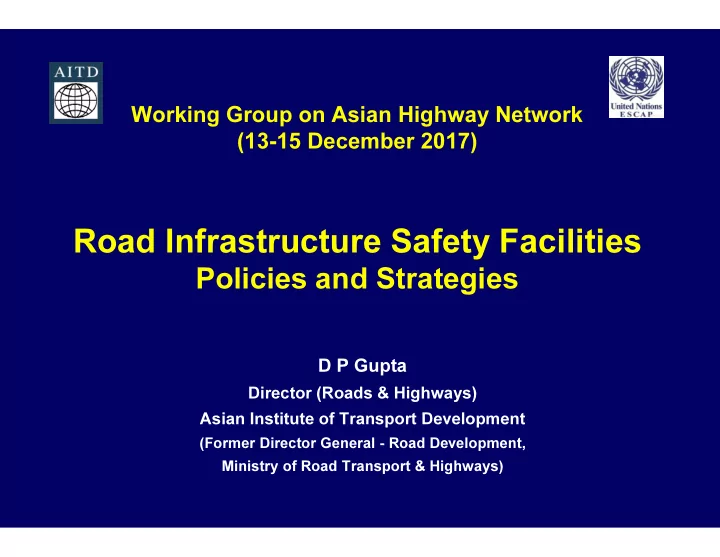

Working Group on Asian Highway Network (13-15 December 2017) Road Infrastructure Safety Facilities Policies and Strategies D P Gupta Director (Roads & Highways) Asian Institute of Transport Development (Former Director General - Road Development, Ministry of Road Transport & Highways)
UN: ESCAP Initiatives � Heartening that UN:ESCAP with support from Korea Expressway Corporation has brought out Design Standards of Road Infrastructure Safety Facilities for the Asian Highway Network � Overall, very good recommendations that cover the imperatives for enhancing road safety � Social concerns need more emphasis
Social Concerns � AITD undertook a World Bank sponsored study of socio- economic impact of Dhanbad-Agra National Highway (part of Asian Highway No.1) � Study revealed: � Inadequate concern for needs of local communities � Fatalities due to head on collisions using same carriageway on divided highway � Lessons � Safety not to adversely affect communities � Minimize burden of land acquisition, especially for multi- laning and green field projects � Conscious provision of underpasses for pedestrian and cattle crossings, highways to be elevated � Review national standards to provide safe and socially responsible roads � Built-in social concerns in road design
An Imperative and Opportunity � Member countries could review their own national standards for the road network depending upon varying traffic conditions in terms of � Traffic Flow � Mix of motorized and non-motorized vehicles � Vehicle performance � Road users behaviour, culture, discipline (and even attitude) � UN:ESCAP design standards do provide several harmonized principles as takeaways by member countries, notably � Self explaining road environment � Forgiving road design � Concept of star rating
Safety on Radar of Government � Motor Vehicles Amendment Bill introduced in Parliament � Intention to set up Road Safety and Traffic Management Board � Stress on Road Safety Audits � Supreme Court set up Committee to oversee actions on improving road safety by stakeholders � Group of State Ministers set up to recommend safety measures � Focus on safety is getting intensified
Asian Institute of Transport Development � Has been facilitating knowledge creation in road safety � Supported the Transportation and Injury Prevention Programme (TRIPP) of IIT, Delhi � Made substantial contribution to Ministerial Declaration on Improving Road Safety in Asia- Pacific Region in 2006 � Recently, the Institute has been tasked by MORTH to serve as Apex Agency for Road Safety in India
AITD: Apex Centre for Road Safety � Focus areas: � Infrastructure safety facility: Design and implementation � Safety audits � Training and capacity building of road departments throughout the country � Research agenda to support IRC in updating of standards − Design to incorporate safe facilities for VRUs − Traffic calming measurers that suit mix traffic − Evidence based safety engineering measures � Set up Centres of Excellence (COE) in various regions of the country � Identify IITs, NITs and other Institutions � Enter into MoUs with COE for − Training support − Research work − Updating IRC standards
Promoting ITS: Traffic Management Centres � Simple IT and ITS solutions � Detect traffic violations, e-challans � Decongest arterial streets � Cameras at signals/intersections � Zoom into number plate � Demand for fine (bluetooth printer) � Store data on violations in Traffic Police Database � Adjust signal timings to the hold-up of vehicles at intersections � Variable message signs
Knowledge Production, Research and Institutional Linkages � Lay stress on technology initiatives and knowledge production in enhancing safety � Identify areas and subjects for research and collection of evidence from ground � Commission research projects with support of academia and research institutions (recently pioneering work on design of roundabouts and country specific highway capacity norms in India) � Create linkages between academic institutions at district, state and national level � Network with international institutions � Learn from international practices � Ensure dissemination: workshops, seminars, interactive dialogues
Success Factors for Enhancing Road Safety � Orientation to social concerns and needs of local communities, VRUs and PwDs � Exchange of scientific principles through international bodies like UN:ESCAP � IRC to revisit its safety standards utilizing � UN:ESCAP design standards for RISF for AH Network � Local traffic conditions � Scientific principles � Evidence based research � Embed safety engineering measures into road design Contd...
� Enhance professional knowledge of road agencies, consultants and contractors through training and capacity building � Create reservoir of Road Safety Auditors � Enhance accountability of field engineers for implementation on the ground � Promote use of IT and ITS in improving safety � Every bit counts � AITD committed to support the noble cause
Thank you On behalf of AITD to provide us opportunity to share these thoughts with the Working Group on the Asian Highway asianinstitute.del@gmail.com
Recommend
More recommend